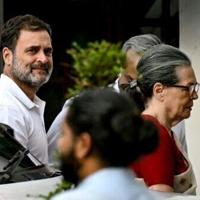After a significant election result that elevated his party from the political wilderness, Rahul Gandhi has been nominated to lead India’s opposition in parliament, setting him up as the chief rival to Prime Minister Narendra Modi.
Modi is set to be sworn into office for a third term this weekend, following an election that saw his ruling Bharatiya Janata Party (BJP) lose its majority, leading to a reliance on coalition allies for governance.
Gandhi’s Congress party saw a substantial increase in parliamentary numbers, almost doubling its strength, marking its best performance since Modi’s initial rise to power ten years ago, contrary to analysts’ expectations and exit polls.
During a Congress leadership meeting, a resolution was passed unanimously recommending Gandhi’s appointment as India’s official opposition leader, a position that had been vacant since 2014.
Further steps include presenting the nomination to a meeting of lawmakers from a Congress-led opposition alliance, which is expected to occur later on Saturday.
Part of a political dynasty that has played a prominent role in Indian politics for generations, Gandhi is the son, grandson, and great-grandson of former prime ministers starting with Jawaharlal Nehru, the country’s independence leader.
If elected, as anticipated, Gandhi will become India’s official opposition leader when the new parliament convenes, a process that local media reports suggest will happen early next week.
Parliamentary rules dictate that the opposition leader must come from a party with at least 10% of the seats in the 543-seat lower house, a requirement that remained unmet for ten years due to Congress’s poor electoral performances.
– ‘Target political opponents’ –
Gandhi, along with other key opposition figures, has faced legal actions that they believe are politically motivated by Modi’s administration.
In a separate case in Gujarat, Gandhi was sentenced to two years in prison in 2023, though he appealed successfully, avoiding incarceration after the Supreme Court intervened.
Recently, Gandhi appeared in a court in Bengaluru over allegations of corruption against the BJP-led administration in Karnataka, filed by a BJP member.
A US think tank, Freedom House, has raised concerns about the BJP using government institutions to target political rivals.
Delhi’s chief minister, Arvind Kejriwal, a partner of Gandhi, was also arrested this year in a corruption probe.
– ‘Another chance’ –
The Congress party’s representation in parliament increased from 52 to 99 seats after the recent election results.
A statement from the Congress executive acknowledged the challenges ahead in restoring the party’s credibility and aiming to return to power in the future.
“The people of India have spoken – the Congress has been given another chance,” the statement read. “It is now up to us to build on it. We must and we will.”
Despite ruling outright for the last decade, Modi’s BJP fell short of repeating its landslide victories this time, necessitating quick negotiations with the 15-member National Democratic Alliance (NDA) coalition to secure the parliamentary support needed to govern.
Modi and his new cabinet members are expected to be sworn in by President Droupadi Murmu on Sunday evening, with leaders from neighboring countries already arriving in New Delhi for the ceremony.
International figures, such as Tesla founder Elon Musk, have extended their congratulations to Modi on his re-election, with Musk expressing excitement about the potential for his companies to engage in India.
In response, Modi appreciated the greetings, highlighting India’s stable democratic environment as conducive to business partnerships.
pzb/gle/qan





